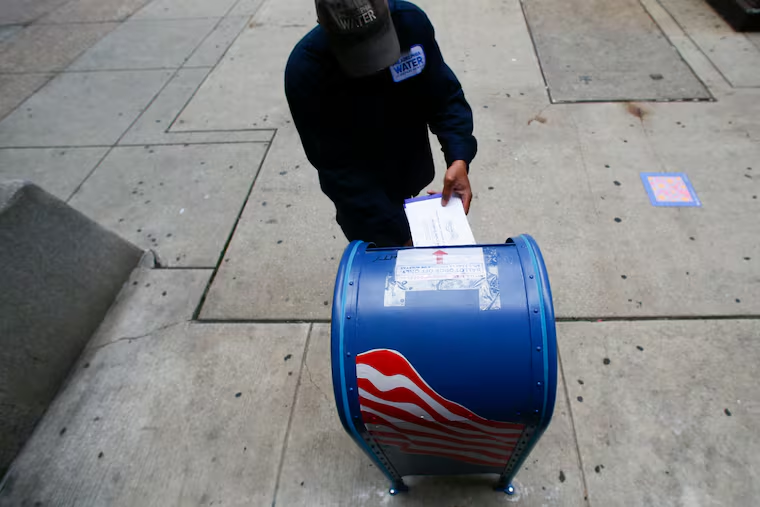Philly officials scramble to prepare for Tuesday’s primary election as unrest continues
Officials relocated staff and about 30,000 ballots from their offices in City Hall as protesters set fire to cars outside and smashed windows.

Philadelphia election officials scrambled Monday to figure out how to conduct an already difficult election during widespread civil unrest.
“We are concerned about the civil unrest activity as it continues to occur, but we hope that tomorrow the voters will be able to get to the polls and exercise their right to vote," said Lisa Deeley, chair of the Board of City Commissioners. “I mean, there is no greater form of protest or letting your voice be heard than going to vote on election day.”
The commissioners, the three elected officials who run the city’s elections, relocated staff and about 30,000 ballots from their offices in City Hall this weekend as protesters set fire to cars outside and smashed windows. The demonstrations demanding accountability for the killing of George Floyd in Minneapolis and broader calls for racial and social justice have led to sometimes violent confrontations with police, damage to property, and looting. On Sunday, the National Guard was brought into the city to help maintain order.
No mail ballots were affected during the protests, said Nick Custodio, deputy commissioner under Deeley, and elections staffers are now working from their satellite office at Delaware Avenue and Spring Garden Street, where much of the logistical work of running elections takes place anyway.
It’s a nightmare scenario for election administrators, who were already dealing with a massive surge of mail ballots due to the coronavirus pandemic and changes to election law. Now, their challenges include figuring out how to:
Protect polling places so people can cast ballots without using a police presence that could intimidate voters.
Assure the security and chain of command of ballots after they are cast.
Ensure that voters who are traveling farther than normal to reach the polls because of reduced polling places will not be affected by street closures or disruptions to public transit.
Staff polling places with enough poll workers, as some drop out due to the ongoing unrest.
Will the unrest disrupt the election?
“Quite frankly, this is the perfect storm of scenarios, and there’s no good election lawyer or anybody who knows the answer to this question. No one does,” said Charles Gibbs, a Philadelphia election lawyer affiliated with Democratic campaigns and elected officials.
The election was already poised to be chaotic. The commissioners slashed the number of polling places in the city by 77%, from 831 to 190, due to difficulties finding locations and poll workers, and more poll workers called in this weekend to say they won’t work the election. Officials were also closely watching to see whether any polling places or drop box locations would be damaged Monday.
One drop box, at City Council President Darrell L. Clarke’s office at 2815 Ridge Ave., will be located in the parking lot instead of inside the office itself.
A citywide curfew, imposed by Mayor Jim Kenney, will take effect at 8:30 p.m. Tuesday to “allow evening voters time to return home before the curfew begins.”
Larry Krasner, the district attorney, said voting would be allowed under the curfew.
The issue of polling place security is complicated. State election law is clear, said Adam Bonin, a Democratic election lawyer in Philadelphia: Police are only allowed to be at polling places when they are called in by poll workers or voters.
“There ought to be some specific, acute need,” he said.
Otherwise, police officers are not allowed within 100 feet of polling places. Nor can any “body of troops” be at election places, which Bonin said he believes would include mail ballot drop boxes.
Police are free to work outside the 100-foot zone, but that could prove complicated given the way hot spots of protest and looting have popped up suddenly.
A police presence could intimidate voters, and “people make a very big deal about police officers at the polling places,” said Gibbs, the Philadelphia election lawyer affiliated with Democrats. .
While police may be called in to ensure peace, he said, “you also have to be very careful about stopping or quelling a person’s opportunity to vote.”
If problems do occur at the polls, the election task force of the District Attorney’s Office will be available at 215-686-9641, 215-686-9643, and 215-686-9644.
City and state officials developed a contingency plan Monday, Custodio said, which includes using emergency paper ballots or relocating polling places.
Whatever happens, Bonin and Gibbs said, elections officials should be prepared to quickly go to court and ask judges to approve whatever plan they have.
“That would be, as an election lawyer, my first remedy if there was some level of disruption taking place at a polling place,” Gibbs said.
A case from the 1980s provides precedent for going so far as to delay the election for specific precincts. (In that case, polling places were unavailable due to flooding and affected voters were given a chance to vote two weeks later.)
“We don’t know what’s going to happen, but I hope that we can find a way to make sure that every voter who wants to vote has a chance to,” Bonin said. “We have the laws, and we have the courts, and if everyone is reasonable, and these are all good people, hopefully we’ll find a way.”